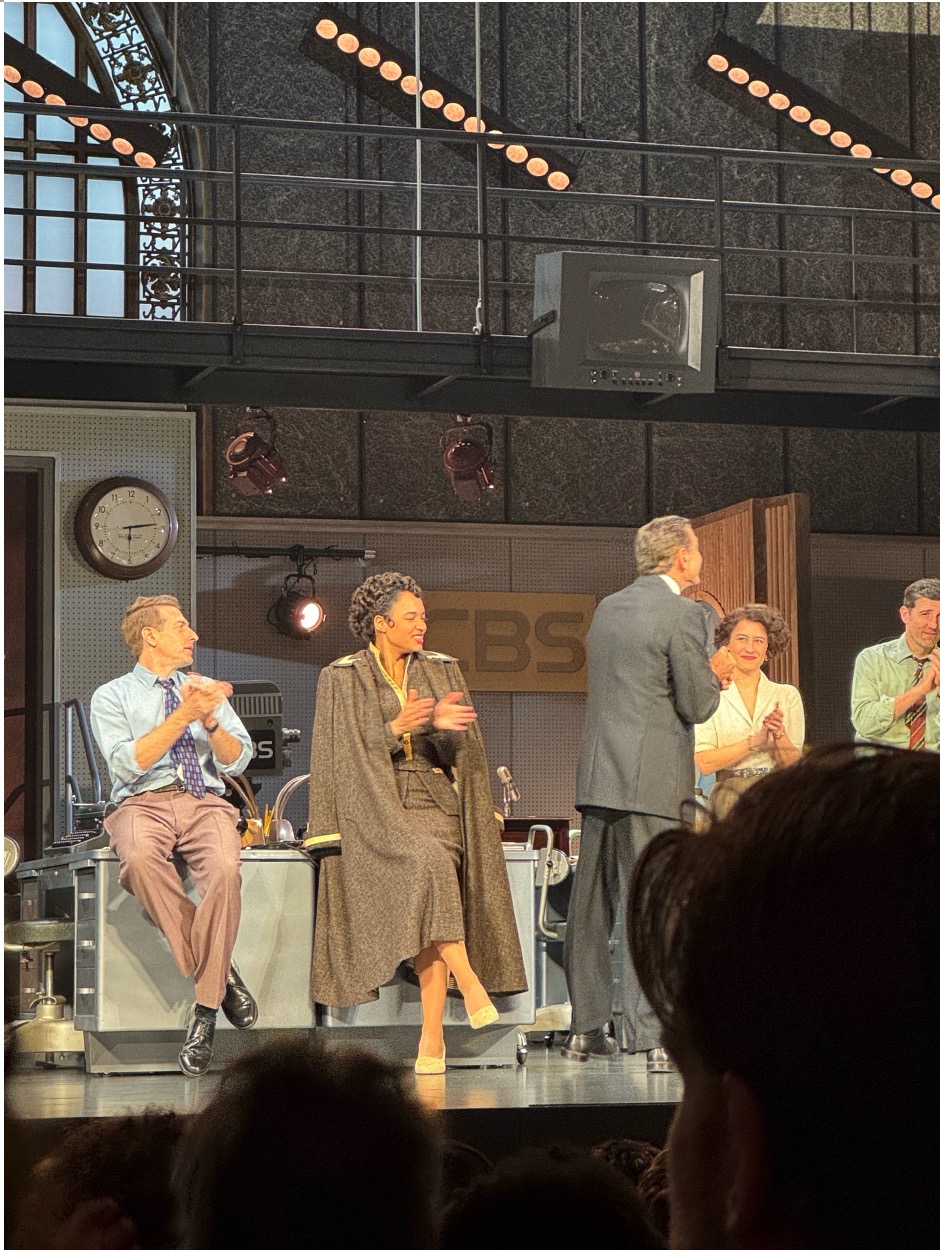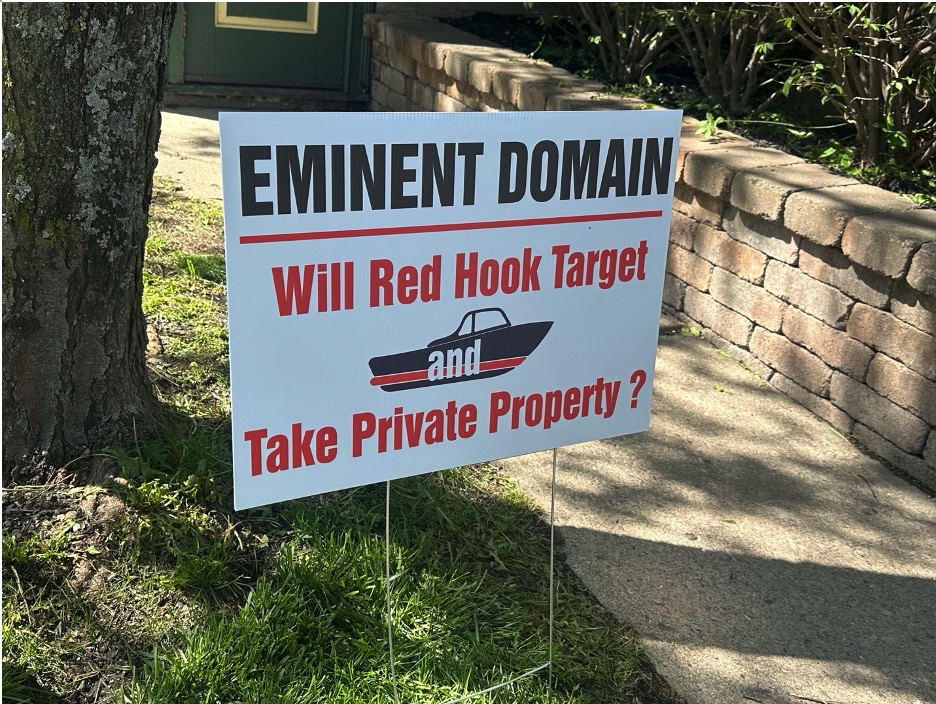Comments
ERIC PREVEN’S NOTEBOOK - When you spend your days reading dense budget memos, swatting away ceremonial proclamations like mosquitoes, and watching a city council try to reinvent civic engagement using the “W” word (“wonderful”), you start to crave a different kind of theater. So, I went to New York.
Two shows. Both are about journalism. Good Night, and Good Luck — all sharp suits and sharper stakes — and Floyd Collins, the strangest musical ever to nail how a media circus forms, spins, and swallows a tragedy whole. The highlight of Floyd? A number called “The Riddle Song,” aka the “Scoop” sequence — a full-blown Vaudeville dance about yellow journalism that manages to be funny, cynical, and just accurate enough to sting.
You know the state of journalism is bleak when the most unflinching reporting happens under stage lights at Lincoln Center with a union-mandated intermission.
There was no intermission for Good Night, and Good Luck, closing June 8 at the Winter Garden, starring George Clooney as Edward R. Murrow, with enough gravitas to make a council president think twice before cutting public comment.
The day I went, there were 1,000 journalism students in the audience — part of a subsidized ticket initiative funded by Clooney, the producers, and TodayTix. The city may not offer much to its youth these days, but here was a front-row seat to a moment that mattered.
Clooney delivered. The cast delivered. The kids behind me called it “fire.” And then, after the curtain, Clooney stepped forward — no script, no spotlight, just George talking about America, its messiness, and why journalism still matters.
The next day, still buzzing, my friend leaned in and said, “He’s not just talking to the students. He’s talking to us. To you.”

Gulp.
Maybe it was the palpable sense that we’ve all been here before — the censorship, the cowardice, the desperate need for someone with a backbone and a camera.
Now — I know, everyone’s chasing a model. Substack, Patreon, monetized access to the fifth paragraph of a particularly timely article. But here’s mine:, I try not to charge for what I write — not because I’m above it, but because the consulting gigs cover the chaos, and more importantly, I believe in keeping the work accessible. If you’re reading this, thank you. That’s the whole exchange. We’re square.
That said, I am for hire. I price myself just above the sanity line.
But value isn’t just about pricing. It’s about showing up. Telling the story. Staying after the performance. Making a promise to keep asking the hard questions — even if it’s only the watchdogs, the kids, and the actors left in the room.
And as George Clooney told all of us — the students, and yes, the smart speakers:
“Here in America, it never goes in a straight line. We mess up a lot. But you’re the future. And we need you. Badly.”
Word.
Lake Trash Revisited: A Field Report from the Hudson Valley Front
I started in Brooklyn. Drove down to save my daughter the trouble—parenting in reverse. We hit Peter Luger, because why not? Since 1887, they’ve been dry-aging meat and not apologizing for the décor. The porterhouse was perfect. Old-school, like it knew better than to update itself. The waiter scowled with integrity.
From there, I headed north. Up to Kingston for my cousin’s gallery show. The crowd wasn’t performative or precious. They were people who’d left the city because the city had started to feel like something other than home. Real people who do Pilates and recovery. You could feel it in the art—a little shaky, but honest. Seeking.
And then I heard it. A whisper, over plastic cups of wine. The Town of Red Hook plans to seize the Boat Club by eminent domain.

Let me say this plainly: the Red Hook Boat Club is not a threat to the public. It is the public. Or at least a certain kind of public that doesn’t need branding guidelines to exist. It’s not expensive, but it is exclusive, I guess. It’s the locals’ place—like the Lake Trash bar in the script. A place where hand-launched boats and hand-shaken deals still count for something. You want river access? It's a sliding gate, a clicker, a nod to the guy who knows your cousin. That kind of river access.
I didn’t come to the Hudson Valley to get activated. But suddenly, I was back in it. Because years ago, I co-wrote a script that basically predicted this.
Lake Trash.
It started with a kid from Massachusetts whose dad moved into the family's busted lake cottage with his best friend Bomber—a guy who could fillet a fish, fix a Mercury outboard, and ruin a wedding in one afternoon. I added the Tivoli details: my friend Cletus Blum and his half dozen brothers had launched the Catmasters catfish tournament—lots of fun and beer—down by the old cottages deeded to locals by the previous generation. In the script, Ray's bar was right there. It was beautiful and ridiculous.
The movie followed Tracy Peppercorn, a cocky bass pro with a resort plan and a sponsorship smile, who comes back to "fix" the lake. Ray Handy Jr. was the one who stayed—a bar owner and catfisherman who couldn’t stand poseurs and knew what the lake meant. Tracy tried to buy out the catfish camp and rebrand the tournament. The locals pushed back with duct tape, dinghies, and plenty of beer. It was meant as satire. Now it plays like prophecy.
Next day, I drove up to see a potter friend from college. She lives just this side of off-grid, Massachusetts, firing her kiln and walking a border collie who seemed shockingly intelligent. We took a long walk. She told me that it now costs over $300 to visit New York—because she's represented by a gallery there, and the work trips are getting cost-prohibitive.
She also told me about a recent motion in her small town to fine property owners who keep more than five cars in their yard — "in the typical great white trash meets the great outdoors way," I asked. She nodded yes.
"There’s simmering tension," she said. Not as a complaint, but as a person who’s seen pots crack from just enough heat. "Too many people coming in with big plans to change everything."
Later, I took three ferries and landed at my ancestral cottage. The wood still knows how to groan in the wind. I slept well.
The next morning, a checkpoint. Two officers barely old enough to rent a car. One looked like a backup dancer for a public service announcement. He flagged me for an expired inspection sticker. I told him we were seasonal. He nodded and took my license.
While he checked it, I thought of a line we’d written for Delta Burke’s character, Cherry Cherry, from Ryan Murphy’s Popular—she tells Erik Estrada from CHiPs who had just pulled her over, she wouldn’t spread ‘em without a wedding ring and a credit check. When the child cop came back, he handed me my ID and urged to take care of it.
I thanked him and told him the wedding ring and a credit check line. He laughed. If I weren’t such a handsome, important-looking, funny guy, it could’ve gone differently.
Before heading back to the city, I got nailed for $9 to drive to Peter Luger’s in Brooklyn—part one of my ongoing congestion pricing study. You get hit once every 24 hours, so technically, you can keep circling the bridge. Careful though: while we’re squabbling over boat docks and permits. We’re very likely being set up. The real prize isn’t the Boat Club. It’s what comes after. The land deal we didn’t see coming because we were all yelling about shoreline equity. And when it does arrive, there won’t be a damn thing we can do about it.
Meanwhile, in the real world—
A neighbor in Red Hook named Muriel just put out the call:
RED HOOK BOAT CLUB—PUBLIC HEARING
Friday, May 16, 2025 @ 6:30 PM
Red Hook High School, Performing Arts Center
The Red Hook Boat Club is a 75+ year old modest, private club at the end of a quiet road in Barrytown. Built by returning WWII veterans. Maintained by local firemen, teachers, tradespeople, and Little League coaches.
The Town Board wants to TAKE it by eminent domain because they WANT to.
Speak out. Show up. Say no to the land grab.
It’s sweet. It’s serious. And it’s happening.
Lake Trash had a happy ending. The town came to its senses. The Catmasters carried on. Ray got the last word.
But this isn’t a movie.
Bomber would’ve taken one look at the script and said, “Let’s go fishin’"
In Other Culinary News: The Schindler Stars Are Out
This week, Michelin unveiled its latest class of gastronomic overachievers across California. Komal, the little corn stall in Los Angeles, made the list. So did Somni in West Hollywood with its shiso tartare tempura, and Vin Folk down in Hermosa Beach with a mussels tart masquerading as a pot pie.
I was recently at Addison, where the wine pairings were paired with other wine pairings, and the final chocolate course arrived sometime after I’d emotionally recovered from the beet. It was exquisite—like dining inside a Schindler house.
But Michelin, we must remember, rewards restaurants.
Schindler, on the other hand, was an architect who immigrated from Austria, and the Awards that I am making up now, celebrate only one thing: the home-cooked meal. The kind delivered without a bill, in a house built for light, laughter, and leftovers.
Which is why this year’s Schindler Award for Culinary Excellence in a Mid-Century Domestic Setting goes to: Me and The Gold House, 1946.
A glass and plywood altar to hospitality tucked in Studio City, the Gold House is all about the public—and if you’re lucky, you might get an invitation. Or at least a football-shaped leftover container.
Its culinary reputation, such as it is, comes from a mythical collective of local artisan chefs who supposedly rotate through its vintage kitchen. James on the grill. Melissa on guacamole. Mary on curry (consumption). Dena’s effortless strata. Ellie’s pita obsession. A loose, joyful crew operating just beyond the grasp of reality.

But of course—it’s just me.
Every dish, every night, every plate. From the chickpea curry to the quiche Lorraine. The bourbon-braised beef, the lentils, the oatmeal chicken meatballs with feta. The tapenade, the cookies, the whipped cream, Zoriana insists on and that we all now crave.
Is it even possible that one person would do all that?
Maybe not. But here's the secret: if it makes you happy?
I love feeding people. And I really, really love dogs.
That combination, however irrational, is our community… values.
So while the stars hang over Addison, and the Michelin inspectors scribble in the dark, we’ll be here: a couple dozen seekers, fourteen dogs, one kitchen.
Come hungry.
Bring a leash.
Offert par la maison.
Full disclosure: Yes, I am acutely aware of the optics involved in giving an award to myself. But when everything is offert par la maison, the conflict of interest pencils out. Cc Ethics
Also—for the record—guests do occasionally bring astonishing things. Thoughtful. Generous. Not required. Never expected. And certainly, no corkage fees.
(Eric Preven is a Studio City-based TV writer-producer, award-winning journalist, and longtime community activist who won two landmark open government cases in California.)










